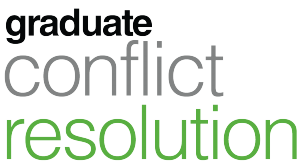Friday, August 4th, 2017...6:18 pm
No Issue is Too Small: conflict resolution in grad school
While graduate students may enjoy small class sizes and work in small groups, grad school can be an oddly isolated experience. Not being exposed to your fellow students and lacking a peer network can be particularly challenging when dealing with conflicts or other interpersonal issues. It can be difficult to understand what the “normal” graduate school experience is like, and I have often felt as if I was the only one struggling with being a grad student. Here is where the Graduate Conflict Resolution Centre (Grad CRC) can help!
The Grad CRC has been operating since January 2016, providing graduate students with conflict resolution and management resources and support. Formed in response to recommendations put forward by the Provostial Committee on Student Mental Health, the Grad CRC aims to support and engage students in the conflict resolution process. The centre offers workshops and training on conflict resolution strategies and a large part of their work is done through the G2G (grad-to-grad) peer advisors.
The G2G peer advisors make up an informal network of peers who are available to talk with you about any issue or problem that you may be dealing with in a safe and confidential manner. They are a diverse bunch, comprised of nine Master and PhD students in a wide range of departments across the University of Toronto. The peer advisors do not advocate or act on your behalf, but they will support you throughout the conflict resolution process. “We respect the autonomy of the student to decide how they want to resolve their conflict,” states Matt, G2G peer advisor and PhD student at the Centre for Drama, Theatre, and Performance Studies. A quarter of all of the issues students discuss with the peer advisors relate to conflicts with supervisors or professors, according to Heather McGhee Peggs, manager of the Grad CRC. Often, students are unaware of the various options (both informal and formal) that are available to them to solve conflicts. “We are here to talk through the issue and let students know that there is more than one way to deal with conflict,” states Priyanka, another G2G peer advisor and Master student in Aerospace Engineering at the University of Toronto Institute for Aerospace Studies.
The G2G peer advisors receive extensive training, with over 35 hours of conflict resolution training, where they develop skills such as active listening, intercultural communication, dealing with power imbalances and imposterphenomenon, and learn about essential graduate policies and resources. Both Matt and Priyanka were drawn to the role of G2G peer advisors because of their previous experience with mentorship. Matt works at the Graduate Centre for Academic Communication, where he teaches courses on academic conversation skills and academic writing for non-English speaking students. Through this role, Matt gained insight into the academic and cultural norms in Canada, as well as how to navigate them. For Priyanka, this role is a natural fit given her prior experience as an informal peer advisor during her time as an undergrad, as well as her own experience dealing with academic culture shock as an international student.
In their roles as peer advisors, Matt and Priyanka have encountered students with a large variety of issues, ranging from difficult relationships with colleagues, to dealing with isolation and loneliness, to coping with imposter syndrome. “Being able to talk through a problem with someone can be very helpful in clarifying the issue,” says Priyanka. And although the peer advisors do not provide counselling services, they can help validate a student’s experience. “Even giving something like imposter phenomenon a name shows students that they are not alone, and that this is something many people go through,” states Matt.
Both Priyanka and Matt stress that no issue is too small to discuss. “Students do not have to be in the midst of a huge crisis or conflict to seek support,” says Matt. Priyanka agrees, stating, “Often students just want to talk about how to manage the general stress of grad school.” Talking to a peer about managing stress can be an invaluable experience, particularly as the culture of academia may often encourage a “deal with it” attitude. But with graduate peer support services becoming ubiquitous across university campuses (including Western University, McGill, York University, and MIT, to name a few), it is clear that schools are recognizing the importance of providing support networks and fostering a sense of community among their graduate trainees.
At U of T, the G2G peer advisors host drop-in sessions all over the St. George campus, as well as having private one-on-one appointments available year-round. Follow the Grad CRC Twitter page for updates on drop-in hours (which are also available on the CLN website), and visit the Grad CRC website to book an appointment.


Leave a Reply